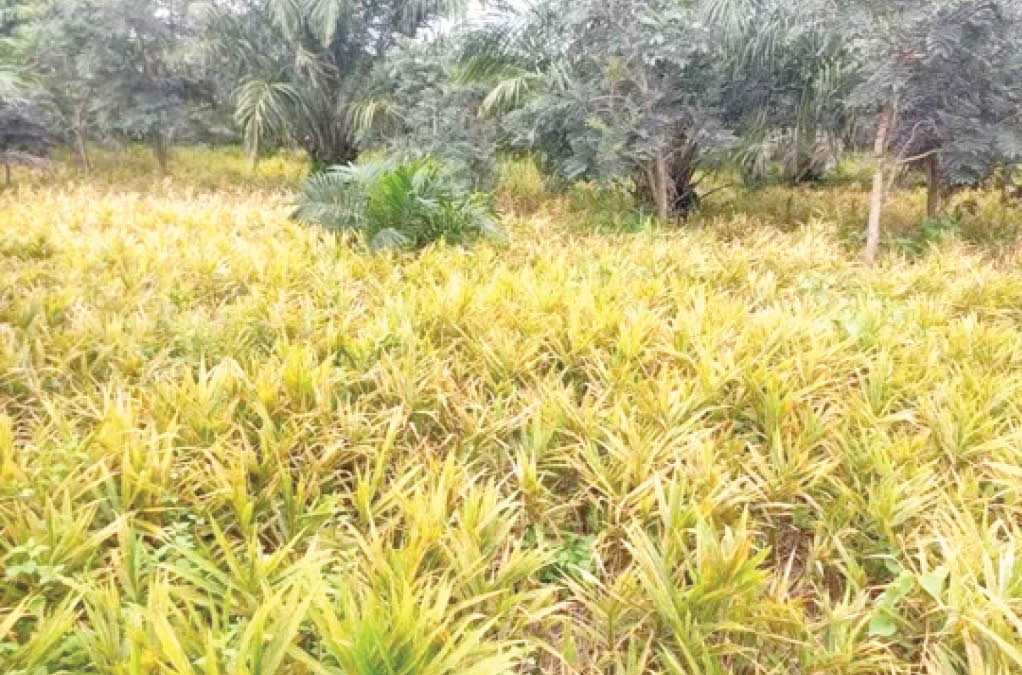Fungal infection: Kaduna ginger farmers count losses, struggle for survival
In the lush fields of southern Kaduna, where ginger cultivation once thrived, a pall of despair hangs heavy over the land. Last season’s fungal onslaught devastated ginger farms, leaving a trail of losses and dashed hopes in its wake. The fungal scourge has left ginger farmers grappling with unprecedented challenges, thrusting them into a battle […]

a ccoconut farm
In the lush fields of southern Kaduna, where ginger cultivation once thrived, a pall of despair hangs heavy over the land. Last season’s fungal onslaught devastated ginger farms, leaving a trail of losses and dashed hopes in its wake.
The fungal scourge has left ginger farmers grappling with unprecedented challenges, thrusting them into a battle for survival amidst economic turmoil.
Ginger farmers in southern part of Kaduna State last season recorded loss as fungal infection attacked their farms, which caused more challenges to them in this new farming season as many of them lost their ginger seeds, in addition to the economic hardship in the country and the hike in prices of fertilizer, insecticides and the ginger seeds.
Emmanuel Gabriel – a ginger farmer from Kuturmirimi community in Kachia local government, who used to harvest 600 bags of ginger seeds was relegated to 20 bags as he lost about N100 million to the fungal infection last farming season.
- Tuta Absolute: Project takes pest management techniques campaign to farmers in Kano
- FG to commence distribution of CBN fertiliser
He recounts the harrowing toll of the infection. “I and my brother lost over N100 million in our farms last season due to the fungal attack on our farms. I now farm only 20 bags of the seeds instead of 600. Each bag of ginger seeds costs N60,000 to N70,000 per bag and I lost my seeds of millions of naira. I don’t have money to farm ginger this time around so I decided to farm maize, groundnut and corn instead of ginger,” he said.
He said another challenge is fertilizer, “One bag of Urea fertilizer is now N40,000 and the more fertilizer applied, the more quantity and quality you get as far as inorganic farming is concerned,” he added.
Gabriel’s plight mirrors that of many farmers across the region. Yakubu Daniel, who hails from Kushe community in Kagarko Local Government Area, echoes the sentiment, revealing a drastic reduction in his harvest from 120 to 150 bags to a meager 100 bags. But the challenges extend beyond the fungal blight, as security concerns loom large over the farming communities. Reports of kidnapping send tremors of fear through the once-tranquil villages, further complicating an already dire situation.
“Apart from losing our seeds last season, which forced me to lose 20 bags from what I get every year, this time we are also facing security challenge of kidnapping. Last Monday, some kidnappers attacked our neighbouring community and this will affect ginger farming as many farmers cannot go to their farms for fear of being kidnapped,” he said.
Farmers in many of the villages in one of the four local government areas suffered losses as the disease was prevalent on almost all farmlands.
The farmers lost over N2bn in the whole of southern Kaduna where the world’s best ginger harvest is realised annually.
The strange disease was noticed in the first week of July 2023, which raised a lot of questions and concerns among the farmers. The strange disease affects the leaves and also the ginger roots (Rhizomes).
According to Shedrack Michael from Kukui community in Kagarko Local Government Area, this year’s farming season came with a lot of challenges as about 98 percent of the farmers in the area were affected with the ginger infection outbreak.
“As peasants farmers in Kagarko LGA area, this time of the year (March, April and May), when the rainy season begins, is mostly when we plant ginger.
“We are left with no seed to plant. The ginger infection outbreak caused a lot of damage to us. The outbreak caught us unaware, unprepared and left us shocked. Ginger is one of the major cash crops in the area; the loss recorded last year has left many us with no seed for this year’s planting season.
“We heard there are few farmers from some parts of Niger and Plateau states with seeds but the outbreak has shut down our major source of income. We can’t afford to buy seed, insecticide and fertilizer for this year’s farming.
“Very little farmers tried farming ginger this year, probably they took loans to be able to afford few seeds. It is yet to start growing; hence, we are yet to know the nature of the germination. The issue of capital to buy the right insecticides is a major challenge also because it is expensive.
As the new farming season begins, the challenges persist. With seeds in short supply and the cost of inputs skyrocketing, many farmers face an uphill battle to reclaim their livelihoods. “We can’t afford to buy seeds, let alone the expensive insecticides and fertilizers,” bemoans Michael. “Our fate hangs in the balance, our future uncertain.”
“We don’t know our fate this year, many of us sell ginger to buy fertilizer, pay school fees, medical bills etc. Now that our source of income has been destroyed, we are calling on the government to help ease the burdens we face by providing seeds, fertilizer, insecticide and other assistants to help curtail the effects of this outbreak on us,” he added.
